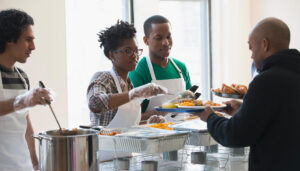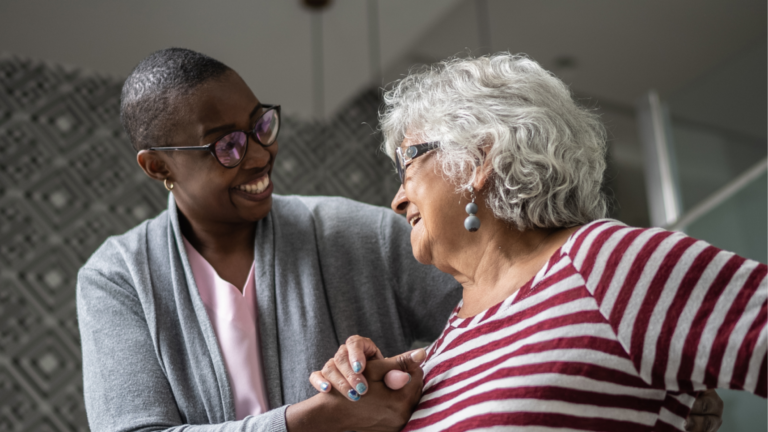
Power in Partnership: Giving Kitchen
 Our Power in Partnership series highlights our national and regional partners and the work they do to build healthier communities.
Our Power in Partnership series highlights our national and regional partners and the work they do to build healthier communities.
Tell us about your organization.
Giving Kitchen (GK) is a nonprofit organization that provides emergency assistance to food service workers through financial support and a network of community resources.
Giving Kitchen grew out of a response to the devastating, stage-four cancer diagnosis of Chef Ryan Hidinger in December 2012. The response to Ryan’s diagnosis — initially from friends within the restaurant industry, and then quickly from an ever-expanding community across Atlanta – was truly heroic: an outpouring of love and financial support to help with his expenses not covered by insurance.
The community’s overwhelming response to the Hidingers’ crisis set the intent, beliefs, and values for Giving Kitchen, which was officially founded in 2013.
Today, food service workers from restaurants, catering companies, concessions stands, cafeterias, food trucks, and tap rooms anywhere in the United States are eligible for direct support from Giving Kitchen, be that with financial assistance, referrals through Stability Network, or both.
What difficulties has your organization faced along the way?
Giving Kitchen is doing something for food service workers that hasn’t been done on this scale before. Building something new comes with challenges! How do we standardize a process for who and how we serve, in a way that is equitable, impactful, and scalable? How do we meet an industry-wide crisis like COVID-19 without throwing all our own guidelines out the window? How can we grow and change to meet our community where they are? These are questions we ask ourselves every day.
When COVID-19 prompted the shutdown of all food service in March 2020, GK Executive Director Bryan Schroeder made the difficult decision to maintain the qualifying crises for financial assistance — meaning that GK would not suddenly start paying unemployment to food service workers laid off due to the pandemic. “It just felt like it would have been a disaster for us,” he said. “That’s not our core mission. It wouldn’t be fair to the guy who broke his leg just before the pandemic.” To meet the demand of food service workers suddenly in need of resources, GK set up a webpage that included information on food banks, community initiatives, and how to obtain federal unemployment support; it was essentially a pandemic-specific Stability Network. The webpage received hundreds of thousands of hits.
During this time, Stability Network reevaluated standard operating procedures. Case managers began filtering inquiries and allowing clients to opt-in for one-on-one case management rather than having case management be the default, since there were so many clients and many requests were for a simple referral that had been shared hundreds of times before. There’s a saying in the restaurant industry: “work smarter, not harder.” Stability Network worked smarter so they could work harder to meet an exponential increase in inquiries; these systematic improvements helped set the stage for a partnership with Unite Us.
What are your thoughts on the state of food security in America?
Food insecurity has been a huge challenge for the food service industry in the U.S., especially since the onset of the COVID-19 pandemic. Food banks, shelters, and private citizens stepped up in a big way to feed our communities when entire industries found themselves out of work indefinitely. But even with that onslaught of compassion and effort, what remained clear was that millions of people were living paycheck to paycheck and when that next paycheck disappeared, so did their access to basic necessities.
Why did you choose to partner with Unite Us?
Our partnership widens the network of resources for food service workers and allows GK case managers to monitor the value and efficacy of Stability Network partnerships for our clients.
“Our partnership with Unite Us has expanded our library of resources significantly, especially in rural areas. With this greater reach, we are better poised to support food-service workers regionally and nationally,” said Senior Stability Network Manager Kaitlynn Mockett.
What do you think has been Giving Kitchen’s most successful initiative?
We quantify success not in dollars given but in overall impact: preventing homelessness, supporting recovery from substance misuse, keeping a family’s utilities connected, and a million other ways to help food service workers feel safe and supported. Perhaps our most successful initiative is that we’ve continued to grow and serve more and more food service workers. The farther we expand and the more food service workers we serve, the more word gets out that Giving Kitchen is here to help food service workers. Our expansion has legitimized our work by proving to our communities that Giving Kitchen is here to help and here to stay.
How does collaborating with community-based organizations play a role in Giving Kitchen’s work?
Stability Network is, at its core, a collaboration with other community-based organizations. What separates GK’s Stability Network from other referral programs is the case management team. Stability Network case managers work closely with clients to find resources that fit their specific needs, and often provide direct referrals that give clients access to services that aren’t otherwise available or may be significantly more expensive without a referral from GK. Relationships with other organizations and independent providers are stewarded by case managers, whose personal mission is to make connections that improve the strength and resilience of our food service community.
What’s next for Giving Kitchen?
Our goal is to serve more and more food service workers who need us. From a recent study, we know that there are over a million food service businesses in the U.S. which collectively employ nearly 16 million people, and food service workers in the U.S. earn an average salary of $20,303 per year ($9.76 per hour). Of GK financial assistance recipients surveyed, 76% say that without help from Giving Kitchen, they would have received an eviction notice, 86% report aid from GK prevented them from incurring a late bill on a utility, and 70% say that GK prevented them from having to skip meals to save money. All of this tells us what we’ve known for years: food service workers, on average, do not have a financial safety net or a network of community resources to keep them afloat in an emergency. We want every food service worker in the U.S. to have a safety net — whether it be Giving Kitchen or another community-based organization — so a single crisis doesn’t compromise their entire livelihood.
For more information about Giving Kitchen, follow @givingkitchen on Facebook, Twitter, and Instagram; visit givingkitchen.org; or visit Giving Kitchen’s Press Room.
Interested in learning more about how community-based organizations are addressing social determinants of health or how to bring Unite Us to your community?
About Unite Us
Unite Us is the nation’s leading software company bringing sectors together to improve the health and well-being of communities. We drive the collaboration to identify, deliver, and pay for services that impact whole-person health. Through Unite Us’ national network and software, community-based organizations, government agencies, and healthcare organizations are all connected to better collaborate to meet the needs of the individuals in their communities.



